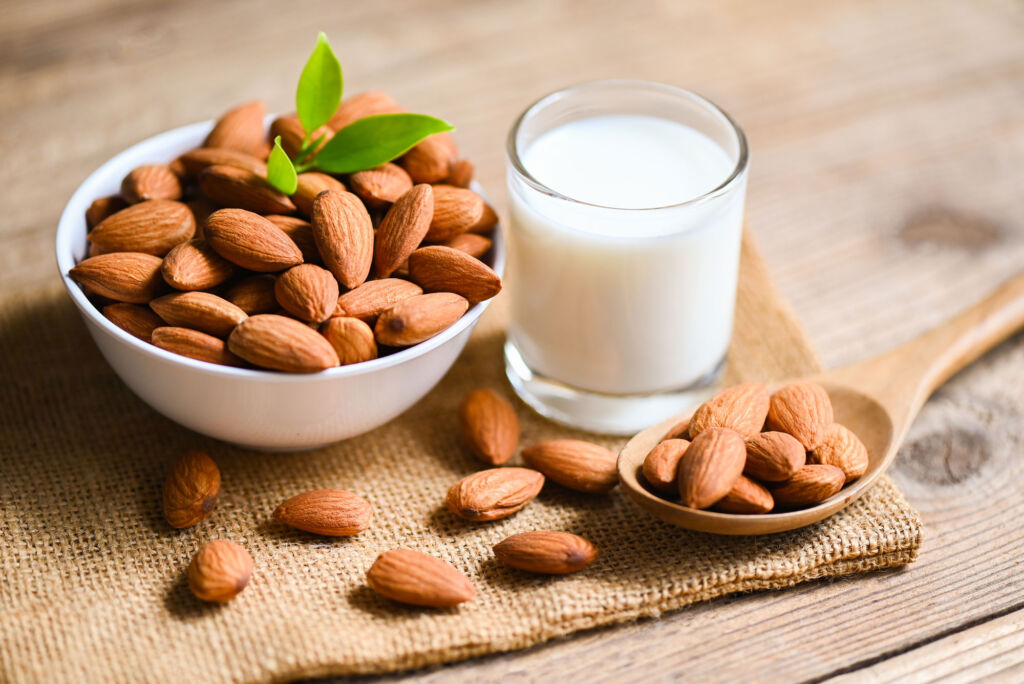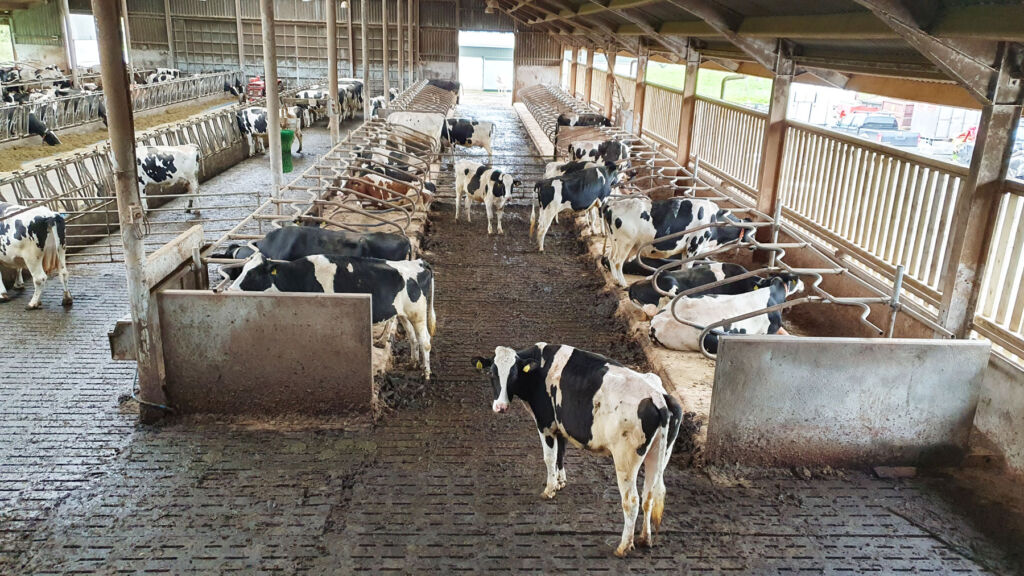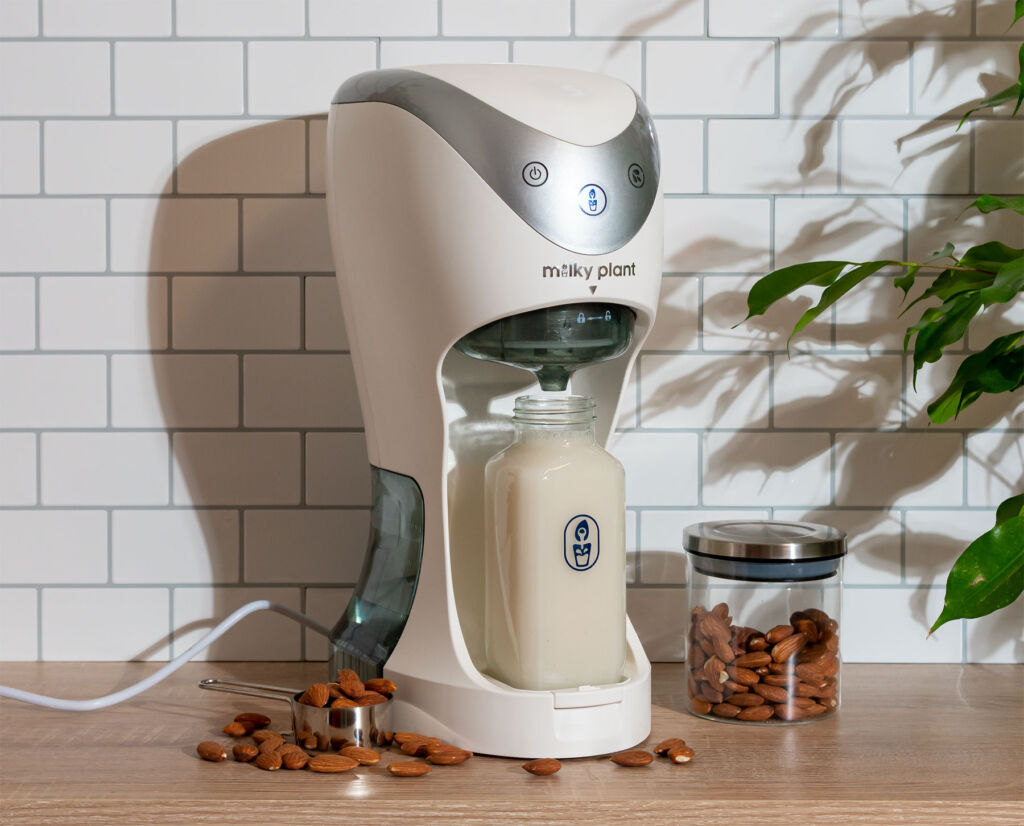

Recently, milk has been making the headlines with news that American consumers are turning towards raw milk. One reason for this is the potential health benefits it brings, and it is also easier to consume for those who have problems digesting lactose. However, there is an easier-to-access alternative for those with a lactose problem, and it’s called Milky Plant, an innovative machine that can make pretty much every plant-based milk conceivable.
During the past couple of years, my wife Natasha and I decided to stop purchasing pasteurised milk and instead only consume raw ‘safely produced’ milk directly from a dairy that allows its cows to come and go as they please, and importantly for us, the cows are all grass-fed. We changed to raw milk because I am one of the estimated 65% of the adult human population with an allergy/intolerance to lactose.
Natasha and I do our best to lead a healthy, organic and sustainable lifestyle, which has involved, eliminating all ultra-processed foods, making our own Kefir and ice cream using raw milk, drinking probiotic water, fermenting, pickling and much more.


Unfortunately, getting the raw milk involves a 25-minute car journey, and as our supplier is away from towns and cities, we try to combine it with a countryside walk to make the most of it. Sadly, the British weather frequently seems to have a mind of its own, which means we sometimes are forced to go without.
As an alternative, Natasha encouraged me to try store-bought oat, rice and almond milk varieties, none of which appealed to my taste buds or my wallet. However, there is a solution, and it’s called Milky Plant. It is a machine that allows you to make sustainable milk at home and refine the taste.


About Milky Plant
Milky Plant was founded by Nadina Grigoras, who realised a life change was necessary after being diagnosed with high cholesterol. She decided that plant-based milk was the way forward; however, upon closer inspection, she discovered that the plant-based milk in the stores wasn’t as natural or healthy as she first thought, with many varieties being high in saturated fat, along with having additives, such as sugar and preservatives.
The only way to get the healthy plant-based milk she wanted was to make it herself. However, as some might know and many will imagine, making plant-based milk at home from scratch takes a lot of time, and in addition, it can be messy.
So, Nadina thought of creating a machine to do it for her; one that is simple enough for anyone to use, isn’t made from single-use plastic, with low energy consumption and is ethically designed. She, along with her co-founder Michael, did precisely that and named it Milky Plant.
Her Milky Plant machine is a fast and straightforward way of making plant-based milk from a wide variety of ingredients such as walnuts, quinoa, oat, almonds, peas, hazelnuts, soya and even potato. All one needs to do is add the preferred ingredients, for example, cashews and strawberries, to the blending compartment, fill the water tank, press a button, and within three minutes, it will produce healthy strawberry-flavoured milk.
While Milky Plant goes about its business of extracting the milk from the core ingredient, the leftover pulp is stored away in an easy-to-access compartment at the front of the machine.
What’s nice about this is it makes cleaning the machine simple, as you can remove the pulp in one block and use the auto-clean function to clean up anything else. Another bonus is the leftover ‘block’ is edible and still nutritious, allowing you to use it in other recipes.
One of the biggest plus points about Milky Plant is, unlike store-bought plant-based kinds of milk, the milk produced by the machine contains no preservatives, gums, emulsifiers and seed oils etc., many of which can be destructive to the gut microbiome.
As with any new and innovative products coming to the market, there is an upfront cost; in this case, it is £290. However, according to Milky Plant, it only takes around 180 uses to recoup the initial outlay, depending on which ingredients are used to make the drink.
Price comparisons:
- 1 x litre of Milky Plant Oat Milk: £0.24p vs approx £2.10 in the shops.
- 1 x litre of Milky Plant Almond Milk: £0.60p vs approx £2.30 in the shops.
- 1 x litre of Milky Plant Cashew Milk: £0.80p vs approx £2.50 in the shops.
If you’re anything like me and need milk daily, it’s somewhat of a no-brainer when you factor in the health benefits and the relatively short time it takes to recoup the initial outlay.
Natasha and I are still at the experimentation stage with our Milky Plant production and are yet to create what we consider to be the perfect milk, which will take some tweaking, given my lifelong love of dairy. To simplify things for those looking to ‘switch’, Milky Plant has a dedicated recipe section on its website, which includes guides for making basic milk and some tasty-sounding desserts.
Over the next few months, we’re confident that with some playing around with the ingredients, we’ll find a ‘basic’ milk recipe that will allow me to alternate between raw and plant-based milk seamlessly.
The growing numbers switching to plant-based milk
We’re not alone in seeking healthy alternatives to store-bought milk. Mintel’s UK Dairy and Dairy Alternatives Market Reports for 2021¹ and 2022 revealed that plant-based milk has continued posting strong growth, even as cow’s milk sales fell.
In addition, half of the launches in the UK dairy market in 2021 came from plant-based drinks suppliers, and the number of people choosing plant-based dairy alternatives is increasing yearly.
Milky Plant – Where and How?
As mentioned above, the plant-based milk-making machine is available to purchase at a reduced price of £290 via https://milkyplant.com/, and the company plants five trees for every order and gives 1% back to the world’s most pressing environmental issues.
In addition, it has recently been enrolled in the Amazon sustainability accelerator scheme, which is an exclusive programme for just fifteen sustainable businesses annually.
References
[1] https://store.mintel.com/report/uk-dairy-alternatives-market-report
Is Dairy Milk the Only Source of Calcium?
When most people think of the health benefits gained from drinking store-bought dairy milk, one of the first things that springs to mind is its calcium content, which is necessary to strengthen bones.
Surprisingly, the latest science shows that milk drinkers do not have a greater defence against bone fragility when compared to non-milk drinkers. It should also be noted that calcium isn’t only found in milk; there are many green leafy vegetables, and even nuts, that contain it.
If you’re looking for an ideal plant-based ingredient from which to make milk, you don’t need to look further than almonds, which are pretty much the kings of calcium in the nut world; and yes, the Milky Plant website has a simple guide on how to make almond milk. Almonds contain 270 mg in a 100-gram serving, providing 26.9% of the RDA for most people.
Should you stop buying milk from shops and stores?
Before it reaches the shelves, store-bought milk will undergo many heat processes due to pasteurisation and homogenisation. The high heat reduces the benefits that come from a large number of microorganisms, enzymes and proteins contained in raw milk. The lack of some of these in store-bought milk makes consuming it more difficult for people with an intolerance/allergy.
Read more lifestyle reviews, news and guides here.
